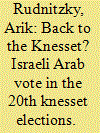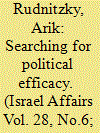| Srl | Item |
| 1 |
ID:
149189


|
|
|
|
|
| Summary/Abstract |
Arab politics in Israel recorded several notable achievements in the March 2015 Knesset elections. Sixteen Arab and Druze candidates were elected to serve in the Israeli parliament, the largest number ever elected. In addition, Arab voter turnout increased significantly compared to previous election campaigns and reached 63.5%, its highest level since the early 2000s, thus reversing a period of political apathy caused by the events of October 2000. These results may indicate a turning point in the political behaviour of the Arab public, and that the Knesset has once again become a relevant arena of political influence for the majority of the Arab public. An analysis of voting patterns in the recent elections in the Arab sector suggests that these changes were spurred by the participation of the Joint List. In many Arab localities, support for the Joint List, which ran as a grouping of the major political parties that have represented the Arab public in recent years, was positively associated with a rising turnout compared to previous elections.
|
|
|
|
|
|
|
|
|
|
|
|
|
|
|
|
| 2 |
ID:
187563


|
|
|
|
|
| Summary/Abstract |
Arab politics experienced dramatic upheavals in the four Knesset elections between April 2019 and March 2021. First was the jump from a significant low turnout among Arab voters in April 2019 (49.2%) to the highest turnout in two decades in March 2020 (64.8%), only to be followed by a historic slump to 44.6% in March 2021. The Arab parties went through a shaky period – from a divided political system that secured only 10 Knesset seats in April 2019 to a historic achievement in the March 2020 elections, when the Joint List won 15 seats, followed by yet another schism resulting in a total of 10 seats in the March 2021 elections. As such, the Joint List’s achievements did not herald the strengthening of the Arab parties’ influence in the Arab street but rather the increasing influence of the public on the political configuration of the parties wishing to represent it. The interrelation between the public and the parties is the outcome of profound processes of political change that Arab society in Israel has undergone over the past two decades. The article discusses these processes and their impact on the political behaviour of the Arab public.
|
|
|
|
|
|
|
|
|
|
|
|
|
|
|
|